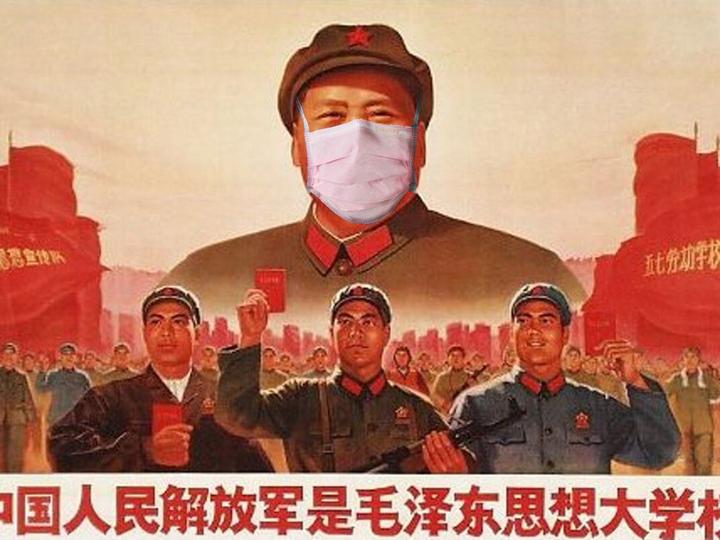2020-04-01
Are we all covid communists now? Or, critical notes on the coming covid corporatism.
Vote Tory, Get Labour,
would seem to be the conclusion to draw from the emergency actions of
the Johnson government over the last few days in response to the
coronavirus pandemic, and British Chancellor Rishi Sunak’s announcement that the British state will effectively nationalise Britain’s wage bill.

Sunak: Nationalise it all...
This was all frankly admitted by one unnamed Tory government minister (was it Sunak himself?), who told the Spectator
that his government would end up implementing much of Jeremy Corbyn’s
programme despite the Tories’ crushing electoral defeat of Labour in
last year’s election. The scale of the government’s economic
life-support programme extends beyond boosting spending or even
continental-style dirigisme (ordering industry to
ramp up ventilator production), to directly paying Britain’s workforce
while in lock-down. This was in turn followed by the de facto nationalisation of Britain’s railway franchise.
It all goes rather further than rolling out fibre broadband to the
Outer Hebrides and improving domestic insulation, two key ‘socialistic’
promises that Labour made in the last election. Boris Johnson and
Sunak’s emergency package is more akin to the ‘disaster socialism’ that
many on the Europhilic left warned against as the supposed dystopian vision of Lexiters.
They condemned disaster socialism as likely to lead to an autarkic
nation trembling behind its borders, ruled by an overweening state
fearfully confronting the contagious, dangerous outside world … Now of
course, the very same literal communists who chided the Brexiters for
disaster socialism chide the government for not going far enough with disaster socialism,
shrieking for continental-style quarantine for Britain, while putting
everyone on the state’s payroll. We are now on the brink of covid
corporatism — a vastly enhanced role for the state in organising social
life, managing the economy, overseeing transportation and directing
industry.

<figcaption>Remember stock piling for No Deal?
</figcaption>The new covid corporatism is not restricted to the Tories in the UK. In
the US, the Trump administration is pushing for a universal basic income
(UBI) for US citizens — a policy that amounts to the caricature of big
government promoted by the old Reaganite right (giving people money for
doing nothing) — while also
promising to protect American workers from mortgage foreclosures.
The latter policy was explicitly ruled out under the Obama
administration during the 2008 crash, which bailed out Wall Street in
preference to Main Street. In addition to
reactivating a Korean War-era state industrial policy, Trump also announced
in a recent press briefing
that he is open to the federal government taking direct equity in
various corporations — partial nationalisation, in effect — in order to
support them through the coming slump. French president Emmanuel Macron,
whose gendarmes have been battling French citizens for many months in
order to crush the protests against his punitive and regressive green
taxes, has seized the opportunity of the pandemic to implement a
full-scale national emergency to crush the
gilets jaunes, while also promising
progressive economic measures as a pay off in return for his citizens’ liberties. Ambrose Evans-Pritchard, chief business correspondent of the
Daily Telegraph calls for us all
to become socialists in order to … to save liberal market capitalism, explicitly channelling Franklin Delano Roosevelt. In a recent editorial, the
Economist magazine has
casually shrugged off decades of championing market liberalism, passively acquiescing to a new era of big government as a
fait accompli. The Canadian company Macquarie Wealth Management even announced that global capitalism is morphing into something
‘akin to a version of communism’ — doubtless a ‘version’ of communism in which they expect to make a healthy profit.
We’re all covid communists now
The
virus has reorganised the world’s economy around state-led planning
without even a single strike or industrial action, let alone a
revolution. It would seem that we are all Covid communists now.
Or are we?
The
scale of the disaster socialism sweeping the developed world in tandem
with the spread of the pandemic — from Italy through Germany and Britain
to the US — is astounding for its sweep and rapidity. The fact that
these programmes are being carried out by governments of varied stripes,
including governments that were supposed to be ‘hard right’ and
‘neoliberal’ according to their critics, such as the Trump and Johnson
administrations, indicates the extent to which these measures are driven
by sheer economic necessity. Even the most austere of the austerian
states, Germany, has switched gears, extending a large spending
programme to buffer the crisis. In some respects, these global measures
could be seen as a populist extension of the disaster socialism that was
enacted for the banks in 2008, which ended up preserving the rule of
the bailed-out classes over the last decade. The current global stimulus
being rolled out through multiple nations’ policies could be even be
seen as an attempt to ‘socialise’ the bankers’ socialism of 2008 —
expanding public support beyond the financial elite to wider swathes of
the population, albeit in an inevitably limited, compromised and halting
fashion.
Neoliberalism: it’s just never been properly tried
We
might quibble about how much stimulus is necessary, where it should be
directed and how, but it seems there is little disagreement about the
need for it. We could disagree say, about whether UBI is to be preferred
to partial wage guarantees as offered in Denmark, or pension
contribution holidays or tax exemptions and how best to expand
industrial capacity to provide critical medical infrastructure and so
on. However it would only be very few, it seems, who would disagree
about the need for an urgent and vast response to deal with the roiling
scale of economic collapse emanating from data on unemployment,
collapsing investment, disrupted supply chains and overburdened,
stripped-down health systems. The scale of the shock to the global
economy overwhelms even the hardest capitalist logic for justifying the
market, for how can ordinary processes of competitive efficiency work
when consumption collapses on this scale? Indeed, the very same airline
corporations pleading for bail-outs are the ones who have behaved
in accordance with neoliberal dictates on enhancing shareholder value —
in this case through share buybacks — which is why they now have no
resources to sustain them through the crisis.
This
‘disaster socialism’ is an ad hoc series of emergency measures
undertaken by governments and leaders of varying competence, but in
essence it repeats economic policies from 2008 that have kept the global
economy fragile for the last decade, choked up with zombie firms
— a fragility now exposed by the virus. It is therefore incumbent on us
to look beyond arguments over the efficacy of immediate responses, and
turn to consider what our long term economic future might look like. The
pandemic can, after all, only affect trends that are already there; it
has no agency of its own. Doubtless the pandemic will accelerate and
strengthen many underlying secular trends such as automation,
indebtedness, as well as consolidating the enormous retailers such as
Amazon, Tesco, Walmart, etc., with their enormous supply chains that
will overwhelm smaller businesses. Market competition continues to give
way to oligopoly, cartels, monopoly. What is also clear from the viral
pandemic is that capitalism must necessarily socialise in order to
survive — even if only at the level of state-led expansion of ventilator
production to help ensure hollowed-out public health systems are not
overwhelmed by populations vulnerable to the virus, leaving them
inaccessible to the work force.
Once
again the necessity of economic socialisation — or even socialism —
across various countries to sustain capitalism is forced upon us by
capitalism’s own development. Given this economic result, we should
perforce consider what is the political system most fitted to the new
economic order emerging before our eyes. It is a question posed
especially sharply in Britain, where a Tory government is delivering an
economic programme to the left of that offered by the Labour Party in
the last election, all the while enjoying robust approval ratings. The
contradiction of this fact alone — Boris Johnson implementing Jeremy
Corbyn’s programme — poses a political question: who is trusted to
govern and why, and what is the political vision that should accompany
economic necessity?
In reflecting on the crash of 2008, Colin Crouch published The Strange Non-death of Neoliberalism in
2011, reflecting on the resilience of neoliberal policies in
perpetuating austerity. Yet from the vantage point of 2020 what is
striking is how rapidly neoliberalism crumbled in the face of a viral
pandemic rather than any social movement or political opposition (after
all, there was none: the left populists all capitulated). That the
political authority of neoliberalism crumbled away so quickly shows that
it had, in fact, been hollowed out long before. As the political
structures of neoliberalism disintegrate, neoliberals and so-called
‘classical liberals’ are left in the position of communists in 1991,
pathetically insisting that their system has never been truly tried or
implemented, that the practice, not the theory was flawed, that it was
thwarted by conditions that were impossible to predict — all the while
failing to draw any significant conclusions from what, on their own
terms, is clearly a theoretical ideal too pure for this fallen world.
Millennial Dystopia

<figcaption>They’ve been waiting for this
Yet the disaster socialism that is replacing neoliberalism is if anything, even less appealing. It is the fever dream of millennial socialists, who have always motivated all their political arguments by disaster — the disaster that would ensue if Britain left the EU, the disaster that will ensue from climate change, the disaster that will ensue from resource depletion, the disaster resulting from species loss and human over-population … If the new global disaster socialism is socialist at all it is an avowedly passive, consumerist vision of socialism, in which we get paid by the state to live under martial law as we supposedly work from home while living on the backs of an underclass that are compelled to work for Deliveroo and Amazon while the rest of the productive economy crumbles away: fully automated luxury authoritarianism. Meanwhile, the boomer generation are killed off by a virus that targets them, freeing up assets for cramped millennials in flat-shares.
We live out a script written over a hundred times in Hollywood disaster movies and TV shows in which we have been prepared for the collapse of civilisation and the need to fundamentally mistrust each other. That so many of those advocating luxury communism last week — complete with asteroid mining in space — are now shrieking for locking us up at home while they dust down planning for war-time economies only indicates the authoritarian opportunism of so many millennial socialists. The very same peoplewho darkly warned of far-right populists inaugurating a new era of fascism insistently demand that civil liberty be brushed aside to justify emergency powers.
The instinctive authoritarianism of governments and elite figures in pursuing lock-downs partly reflects the legacy of neoliberalism in as much as it reflects the underlying technical incapacity of the state — insufficient testing kits, insufficient ICUs, insufficient hospital beds, insufficient ventilators — to be able to withstand worst case scenarios projected in the pandemic. Health systems that have been stripped-down in the interests of curbing public spending, and over-regulated in efforts to construct efficient market-style competition, now have no spare capacity to respond to potential shocks.
However and perhaps more importantly the authoritarianism also reflects political incapacity too — the inability of states to mobilise their citizens. Neoliberalism hollows out not only state capacity but political capacity, too. Without such political capacity, the only option left is to assert greater state control over the population. What is being
offered now is the prospect of a digital Keynesianism in which cash is funnelled directly to the consumer, without the need for even the show of large public works schemes — and without any of the social solidarities of class and nation (let alone the requisite administrativecapacity) that were needed to sustain earlier Keynesianism,
This is why, as James Meadway has pointed out, the analogies to war-time economies are false— we are witnessing a massive programme of demobilisation, not mobilization. This reflects the fundamental lack of political authority
and state legitimacy: the political capacity for mobilisation simply does not exist except perhaps in China, and even there it is clearly more coercive than voluntary. During the last emergency regime following the terror attacks of 11 September 2001, the Bush administration of thetime only mobilized US citizens to the war effort to the extent that it encouraged them to keep on shopping tokeep the economy afloat. In today’s emergency regime, we are being demobilized even further, confined at home, not even allowed to carry out our patriotic duties of consumption together in public.
Hall of MirrorsKeynesianism,the economic programme of the post-war period that failed in the 1970s, is now being revived to substitute for the failure of neoliberalism, which was in turn an attempt to revive the failed liberalism of the interwar period to substitute for the failure of Keynesianism. Humanity seems lost in a labyrinthine hall of mirrors comprising endless historic dead ends, grossly distorted images and misshapen reflections. The permanent emergency politics of the last few decades is now being extended to legitimate a new economic regime, which will inaugurate a new order of state capitalism. This takes us back to the original question. Given the dystopian ugliness of the disaster Keynesianism being rolled out now, what is a politics more suited to our new era?
Writing for
Novara Media,Grace Blakeley tackles this question directly. She argues that the
viral pandemic will accelerate the emergence of a new oligarchy of state-dependent big business. She urges us to be ready to democratize this new state capitalist regime, advocating the revival of sectoral bargaining as part of a programme of political change in order to enhance accountability. In her view, state expansion and democratization
should go in tandem. However her vision of democratization is a technocratic one that accepts the politics of fear driving the new capitalism, but seeks to make it more accountable through a variety of new state management boards. Her argument bears the imprint of the neoliberal era that is already crumbling away, in which she gives voice to the interests of the squeezed professional managerial classes (the PMC). How can their position be best secured in the new corporatist structures?
If we do genuinely wish to democratize the economy, the first question should be, to what purpose? The element that is missing from Blakeley’s account of democracy — and the element that makes any model of supposed socialism actual and meaningful — is freedom, that is to say, increasingthe scope and degree of control over social life exercised by the mass of ordinary citizens. In the millennial socialist version of democracy, the masses are made up of renters, the precariat, the vulnerable — those in need of protection by the covid corporatist state, overseen by a newelite of technocratic planners. Yet without a collective and popular will to self-government that can be given political voice, representation and institutionalisation, ensuring ‘accountability’ and ‘greater public scrutiny’ under the new state capitalism will ultimatelyamount to little more than a jobs boom for the middle classes, enjoying the perks and powers of a new generation of quangos. Without a vision and purpose for democratisation, the new covid corporatism will continuestumbling from one emergency regime to another.
</figcaption>
@thephilippics
Länk: https://medium.com/@thephilippics/are-we-all-covid-communists-now-9825a2067d51




